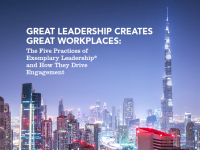 This is a guest post from eLearning Africa 2016 Silver Sponsor Wiley
This is a guest post from eLearning Africa 2016 Silver Sponsor Wiley
Not too long ago, normal meant stable. Normal meant slow and steady. Normal meant you could predict what was going to happen tomorrow based on what happened today.
But the world is very different now. In today’s reality, normal means disruption. Normal means change. Normal means expect the unexpected. Normal means that you can’t predict tomorrow’s winners based on today’s successes. Normal means that leaders and their teams have to be able to adapt quickly to changing circumstances.
Disruption, change, unexpected, unpredictable, and adapting are words that have come to define the new normal; they also describe circumstances that demand leadership. As surprising as it may sound, in these challenging and difficult times, we’re likely to see some of the most extraordinary leadership we’ve seen in decades. Leaders, it turns out, don’t do their best when they’re maintaining the status quo or when they feel comfortable. They do their best when faced with adversity, crisis, setbacks, and uncertainty (Kouzes and Posner, 2014).
Change is the context for leadership. It is the work of leaders to inspire people to do things differently, to struggle against uncertain odds, and to persevere toward a misty image of a better future. Without leadership, the extraordinary efforts necessary to solve existing problems and realize unimagined opportunities would not be made. We have today, at best, only faint clues of what the future may hold, but we are confident that without leadership the possibilities will neither be envisioned nor attained.
Great results in the marketplace and in the community can only come about by making extraordinary things happen within your organisation. The key is great leadership. There is overwhelming evidence that great leadership creates great workplaces; and, in turn, great workplaces create great results. So, if you want better results in your marketplace or your community, you have to ensure that you are working on fostering great leadership within your organisation.



















This is a very healthy way of thinking because we as leaders must be prepared for a change and equally like a person who is travelling from one point to the other, you never know for sure that all be be as per the plan .
For example, the seat resevations may change , the flight schedule may be delayed, the host may not turn up at the Airport at the agreed time and the accmodation plans may be disrupted similarly, the weather may change and affect your return flight plan.
In the same manner is the “Normal” management today
Thank you eLearning Africa, I find this to be highly educative.